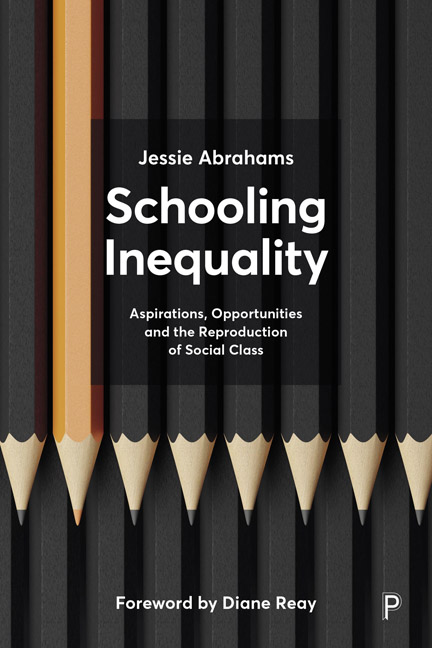Book contents
- Frontmatter
- Dedication
- Contents
- List of figures and tables
- List of abbreviations
- Acknowledgements
- Foreword
- Introduction
- 1 Reproduction: social class inequality in education
- 2 The three schools
- 3 Aspiration, aspiration, aspiration: “The only thing they’ve forced me to do is keep my options open”
- 4 Knowledge, familiarity and physical proximity: “Everyone in my family has gone to university, I don’t see why I shouldn’t”
- 5 Option blocks that block options (GCSEs)
- 6 Packages, facilitating subjects and ‘keeping the options open’ (A levels)
- 7 Institutional concerted cultivation
- 8 Aim lower: leashing aspirations and internalising notions of (in)ability
- 9 Jake’s story: a journey to reflexivity
- Conclusion
- Appendix I Questionnaire
- Appendix II Parental Standard Occupational Classification 2010 groups
- Appendix III Grand Hill Grammar careers event question sheet
- Appendix IV Vignette sample
- Notes
- References
- Index
5 - Option blocks that block options (GCSEs)
Published online by Cambridge University Press: 18 December 2024
- Frontmatter
- Dedication
- Contents
- List of figures and tables
- List of abbreviations
- Acknowledgements
- Foreword
- Introduction
- 1 Reproduction: social class inequality in education
- 2 The three schools
- 3 Aspiration, aspiration, aspiration: “The only thing they’ve forced me to do is keep my options open”
- 4 Knowledge, familiarity and physical proximity: “Everyone in my family has gone to university, I don’t see why I shouldn’t”
- 5 Option blocks that block options (GCSEs)
- 6 Packages, facilitating subjects and ‘keeping the options open’ (A levels)
- 7 Institutional concerted cultivation
- 8 Aim lower: leashing aspirations and internalising notions of (in)ability
- 9 Jake’s story: a journey to reflexivity
- Conclusion
- Appendix I Questionnaire
- Appendix II Parental Standard Occupational Classification 2010 groups
- Appendix III Grand Hill Grammar careers event question sheet
- Appendix IV Vignette sample
- Notes
- References
- Index
Summary
Introduction
The previous chapter demonstrated that most participants vocalised ‘high aspirations’ for the future, though the extent to which they felt confident of fulfilling these varied. This chapter turns attention to the opportunity structures within each school which either enable or restrict young people's chances of succeeding in realising their aspirations. The pupils in each school already come from vastly different backgrounds with differing levels of resources (see Chapter 2). Thus, to what extent do the schools’ opportunity structures compound this privilege or disadvantage? It is important to shed light on these issues of inequality because within the system of education and the labour market, all young people are judged on the same terms. Their subjects studied and grades achieved are viewed as outcomes of their own personal ‘choice’ and ability.1 This chapter disrupts such a discourse by arguing that young people's choices must be understood as situated within different contexts. In Eagles Academy, General Certificate of Secondary Education (GCSE) (and A level2) options are located within a ‘blocking system’, whereby pupils select subjects from specific timetable ‘blocks’. While the language of the blocking system may appear neutral at the outset, referring merely to the grouping of subjects, as I will discuss in this chapter, the system also functions to ‘block’ some routes for some young people. In contrast, the pupils at both Grand Hill and Einstein High benefit from a system of enhanced choice, with a vast array of GCSE (and A level) options and no restrictive criteria in place to ‘block’ any pathways. Drawing mainly upon theorising of Bourdieu and Passeron (1979; 1990 [1977]) and Bowles and Gintis (2011 [1976]) this chapter contributes to an understanding of how school systems and regimes continue to have strong implications for young people's educational pathways.
‘Option time in Year 8 is extremely important. The decisions you make now will be a significant step for your future life choices’
As is indicated by the title of this section (a quote from the vice principal of Eagles Academy taken from the Year 8 options booklet), the decision to take certain GCSEs over others will be directive of the pathway a young person is subsequently able to follow. That is, certain subjects will open doors while others will close them. This situation is compounded by the A level options presented and chosen (see Chapter 6).
- Type
- Chapter
- Information
- Schooling InequalityAspirations, Opportunities and the Reproduction of Social Class, pp. 72 - 85Publisher: Bristol University PressPrint publication year: 2024

